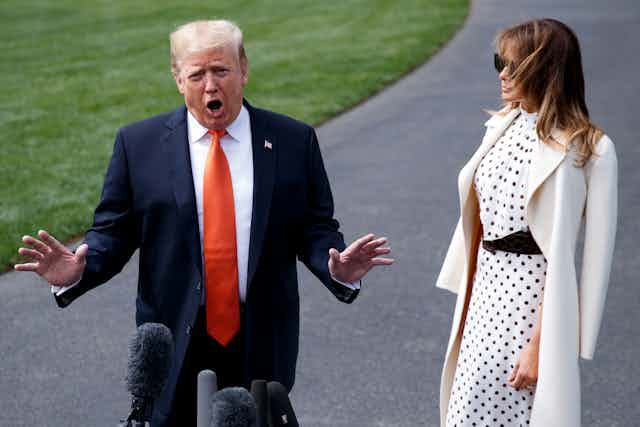Donald Trump has repeated unverified claims that Britain’s intelligence agencies spied on his 2016 presidential campaign, a day after Buckingham Palace confirmed he would make a three-day state visit to the UK in June.
Trump was tweeting in response to former CIA analyst, Larry Johnson, who told the conservative One America News network, he believed the earlier claims that had first emerged in 2017 to be true. “It is now just a question of time before the truth comes out, and when it does, it will be a beauty,” Trump tweeted.
Trump’s tweet prompted another rebuke from the UK’s intelligence, cyber and security agency, the Government Communications Headquarters (GCHQ). “The allegations that GCHQ was asked to conduct ‘wire tapping’ against the then President Elect are nonsense. They are utterly ridiculous and should be ignored,” a GCHQ spokesperson told Reuters news agency.
In 2017, Sean Spicer, who was White House press secretary at the time, repeated allegations originally made by Fox News legal analyst Andrew Napolitano that president Barack Obama had “used GCHQ”. American officials were quick to dismiss the claims, showing a “complete lack of understanding” of US-UK intelligence relations. “It would be epically stupid,” said one official. GCHQ were quick to issue an unprecedented rebuke, and US officials promptly denied the claims, saying they would “not repeat” them, following pressure from UK officials.
So is there any truth behind the claims? Well, no. For conspiracy theorists and believers in the “deep state”, the GCHQ story is a useful tangent. The idea that Trump is the victim of a wider conspiracy has been a major theme of his latest outbursts, following the publication of special counsel Robert Mueller’s report on Russian efforts to interfere in the 2016 campaign. The problem is that conspiracies are quick to form, and difficult to erase, despite evidence to the contrary.
Johnson, who provoked Trump’s latest outburst, was the source of the original GCHQ story. He was also the source of other equally outrageous claims.
Reports quoting sources from both UK and US intelligence agencies – and supported by European agencies – do, however, suggest that GCHQ found out about “interactions” between Russian agents and figures close to Trump’s inner circle in 2015. The issue was deemed so sensitive it was handled at director level by GCHQ’s then director Robert Hannigan, who shared the material with CIA head John Brennan. There is no suggestion that GCHQ was investigating Trump, rather that the contacts showed up in routine surveillance of Russian intelligence.
But despite evidence to the contrary, the GCHQ connection has remained a useful bogey for “deep state” believers and Trump himself.
Keep calm and carry on
But while the president seems happy to attack the UK, just days after his state visit was confirmed, the special relationship between intelligence agencies is resilient. Just as Trump’s earlier claims of wiretapping were dismissed by officials on both sides of the Atlantic, the same will happen in this case.
While politicians will never see eye-to-eye, officials in GCHQ and its US counterpart, the National Security Agency (NSA), realise that intelligence sharing is vital to mutual security. In the 1970s, despite president Richard Nixon’s best efforts to cut off vital sharing arrangements, intelligence officials found new ways to share information. The mutual threats of Russia, China and international terrorism, mean there’s too much at stake. The longevity of the alliance, geography and language are other important factors.
The GCHQ story is an unwelcome distraction in transatlantic relations, but its impact will be short lived. Intelligence officials will just shrug their shoulders and continue their work.

